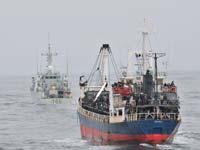$12 million war chest to fight human smugglers

In the Silom Road neighborhood of Bangkok, the Sri Lankan Tamils loiter at the food stalls looking around nervously for any sign that may give them away.
They are waiting for the promise of a passage to Canada – a promise made by human smugglers that’s has already caused them a small fortune.
Like those that arrived on the the MV Sun Sea off the coast of British Columbia, and the MV Ocean Lady carrying about 100 Tamil asylum seekers before it in 2009, these Sri Lankans believe that they too will make it to Canada.
Across the South China Sea at the Ninoy Aquino International Airport, four Chinese nationals are preparing to board a flight to Los Angeles, California, and Vancouver, Canada
Of the four, Jiang Wen and Lin De Wum were bound for Vancouver while the two others, Chen Nan and Chen Shaojin, were destined for Los Angeles.
Each of them paid between $7,000 and $8,000 to members of a human smuggling syndicate in China that facilitated their travel papers and arranged their trip first to Indonesia and then to Philippines. They had fake Canadian and U.S. visa stamped on their passports.
However, alert immigration officers at Manila found them earlier this month and put on a plane back to China.
Across Southeast Asia today, experts say thousands of illegal immigrants are at staging points in various cities waiting for human smugglers to ship them to Canada.
Last week, Prime Minister Stephen Harper, who was in Thailand announced that Canada will pump about $12 million initially and perhaps more for projects that combat human smuggling in the region
“Thailand is an important partner in efforts to reduce human smuggling and terrorism in Southeast Asia,” said Prime Minister Harper. “The support being announced today will help the Thai government make the country safer for its citizens and foreign travellers, and ensure it is not used as a conduit for human smuggling.”
Support for projects that combat human smuggling in Thailand and Southeast Asia will be provided through the Government of Canada’s Anti-Crime Capacity Building Program (ACCBP), and will enhance stability through increased cooperation and capacity building.
These initiatives not only help address security issues in the region, but also address threats to Canadians and Canadian interests.
Of these allocated funds, $2.5 million has been committed for projects developed in collaboration with Thailand to strengthen the capacity of the Royal Thai Police to detect and prevent human smuggling. Another $4.5 million will support anti-human smuggling programming in Southeast Asia.
Since 2005, Canada has invested more than $4 million for regional initiatives in the fight against the threat of global terrorism, including $1.2 million for initiatives in Thailand, through the Counter-Terrorism Capacity Building Program.
Here are some of the projects financed by Canada;
• About $1,930,000 will be used to provide communications and navigation equipment to the Royal Thai Police, including its marine units, and provide them with a database to track and investigate major cases. The RCMP will support the delivery of training which will take place in Canada and Thailand.
• About $481,000 will be used to provide equipment and advanced training for the detection of fraudulent travel documents and the analysis of immigration and border information to the Immigration Bureau of the Royal Thai Police.
• About $178,147 will be used for post-training support to frontline officers in travel document examination, this project will provide additional on-the-job training for Southeast Asian immigration officers in Cambodia, Indonesia, Lao People’s Democratic Republic (PDR), Malaysia, Thailand, and Vietnam.
• About $1,295,267 will be used to train up to 110 law enforcement officers from seven Southeast Asian states (Cambodia, Indonesia, Lao PDR, Malaysia, Thailand, The Philippians and Vietnam).
• About $1,200,000 will be used to create inter-agency Port Intelligence Units (PIUs) with a tactical intelligence gathering and analytical capacity to prevent human smuggling operations in Indonesia, Cambodia and Thailand. The units will be situated in order to allow them to respond effectively to maritime migrant smuggling activities in Southeast Asia.
Leave a comment






